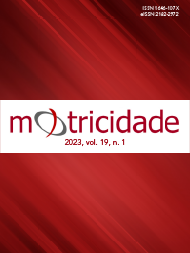A influência das distâncias viajadas nos indicadores de performance das equipes do campeonato brasileiro série A nas temporadas 2015-2019
DOI:
https://doi.org/10.6063/motricidade.26867Palavras-chave:
Viagem, Desempenho, Qualidade, PontuaçãoResumo
O presente estudo apresenta os seguintes objetivos: i) verificar os indicadores de performance das equipes do Campeonato Brasileiro Série A dos anos de 2015 a 2019 em relação às distâncias viajadas para as partidas; ii) comparar a pontuação conquistada por partida de acordo com a qualidade do adversário e distância viajada. A amostra analisada consiste em todos os jogos do Campeonato Brasileiro série A de 2015 a 2019. Os dados foram coletados no site InStatScout (InStat Limited, Limerick, Irlanda), foi utilizado o site da CBF para consultar o local da partida e a qualidade das equipes (www.cbf.com.br). As distâncias viajadas em linha reta foram calculadas em um site especializado (https://www.cidademapa.com.br/). Os resultados demonstraram que as equipes que não viajaram apresentaram melhores índices de desempenho ofensivos e defensivos (p<0,001) e maior pontuação por partida (p<0,001). As equipes que fizeram viagens muito longas (>1000km) apresentaram maiores déficits nos índices de desempenho (p<0,001). As equipes ganharam menos pontos por partida quando enfrentaram adversários de alta qualidade (p<0,001) e, parece que essa pontuação diminuiu ainda mais com viagens muito longas (p<0,001). Assim, a logística de viagem parece ser fundamental e pode ser mais um fator a ser considerado pelas comissões técnicas ao planejar as cargas de treinamento e as estratégias para os jogos.
Downloads
Publicado
Edição
Secção
Licença
Os autores dos manuscritos submetidos para publicação deverão ceder, a título integral e permanente, os direitos de autor (copyright) à revista Motricidade e às Edições Sílabas Didáticas. A cedência de direitos de autor permite a publicação e divulgação do artigo em formato impresso ou eletrónico e entrará em vigor a partir da data de aceitação do manuscrito. Os autores concedem, ainda, os direitos para a revista Motricidade utilizar e explorar o respetivo artigo, nomeadamente para licenciar, ceder ou vender o seu conteúdo a bases de resumos/indexação ou outras entidades.
Nos termos da licença “Creative Commons”, os autores poderão reproduzir um número razoável de exemplares para uso pessoal ou profissional, mas sem fins comerciais. Nos termos da licença SHERPA/RoMEO, os autores poderão, ainda, disponibilizar/arquivar uma cópia digital final (versão postprint) do artigo no seu website ou no repositório científico da sua instituição.


